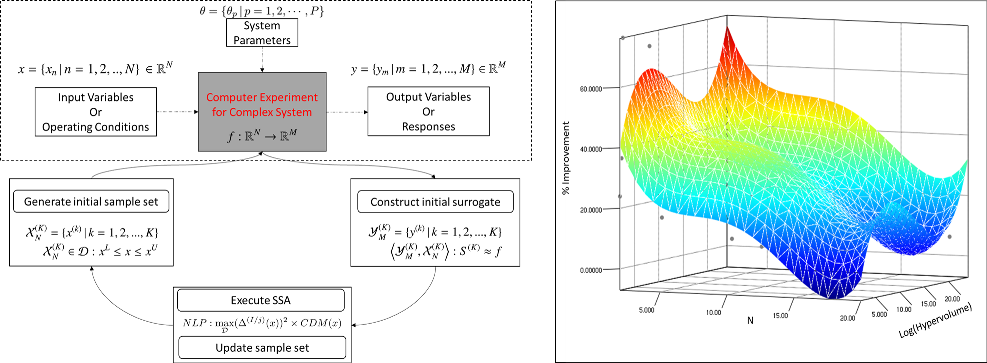Technical Report 185, c4e-Preprint Series, Cambridge
Evaluating Smart Sampling for Constructing Multidimensional Surrogate Models
Reference: Technical Report 185, c4e-Preprint Series, Cambridge, 2017
- Extensive numerical evaluation of smart sampling algorithm (SSA) is performed using a diverse test bed of analytical functions.
- Robustness of the performance is examined for SSA over the wide ranges of dimensions and domain sizes.
- Numerical comparison of SSA with existing adaptive approaches is illustrated.
- SSA is employed for three process systems engineering case studies to demonstrate its practical applicability.
 In this article, we extensively evaluate the smart sampling algorithm (SSA) developed by Garud et al. (Computers & Chemical Engineering, 96, 103-114, 2017) for
constructing multidimensional surrogate models. Our numerical evaluation shows that SSA outperforms Sobol sampling (QS) for polynomial and kriging surrogates
on a diverse test bed of thirteen functions. Furthermore, we compare the robustness of SSA against QS by evaluating them over ranges of domain dimensions and edge
length/s. SSA shows consistently better performance than QS making it viable for a broad spectrum of applications. Besides this, we show that SSA performs very well
compared to the existing adaptive techniques, especially for the high dimensional case. Finally, we demonstrate the practicality of SSA by employing it for three case
studies. Overall, SSA is a promising approach for constructing multidimensional surrogates at significantly reduced computational cost.
In this article, we extensively evaluate the smart sampling algorithm (SSA) developed by Garud et al. (Computers & Chemical Engineering, 96, 103-114, 2017) for
constructing multidimensional surrogate models. Our numerical evaluation shows that SSA outperforms Sobol sampling (QS) for polynomial and kriging surrogates
on a diverse test bed of thirteen functions. Furthermore, we compare the robustness of SSA against QS by evaluating them over ranges of domain dimensions and edge
length/s. SSA shows consistently better performance than QS making it viable for a broad spectrum of applications. Besides this, we show that SSA performs very well
compared to the existing adaptive techniques, especially for the high dimensional case. Finally, we demonstrate the practicality of SSA by employing it for three case
studies. Overall, SSA is a promising approach for constructing multidimensional surrogates at significantly reduced computational cost.
Material from this preprint has been published in Computers & Chemical Engineering.
PDF (1.8 MB)



